Unit 8 It must belong to Carla. Section A (3a-3c)阅读课(共28张PPT,内嵌音视频)
文档属性
| 名称 | Unit 8 It must belong to Carla. Section A (3a-3c)阅读课(共28张PPT,内嵌音视频) |
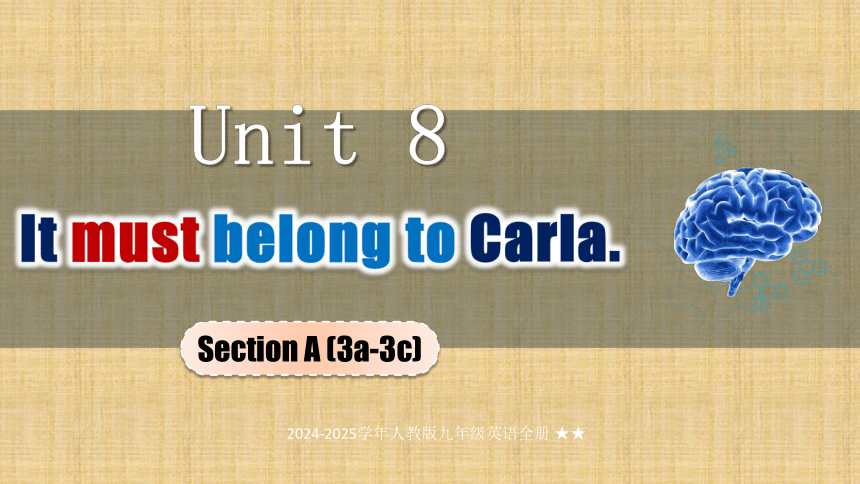
|
|
| 格式 | pptx | ||
| 文件大小 | 51.7MB | ||
| 资源类型 | 教案 | ||
| 版本资源 | 人教新目标(Go for it)版 | ||
| 科目 | 英语 | ||
| 更新时间 | 2024-11-29 19:24:21 | ||
图片预览

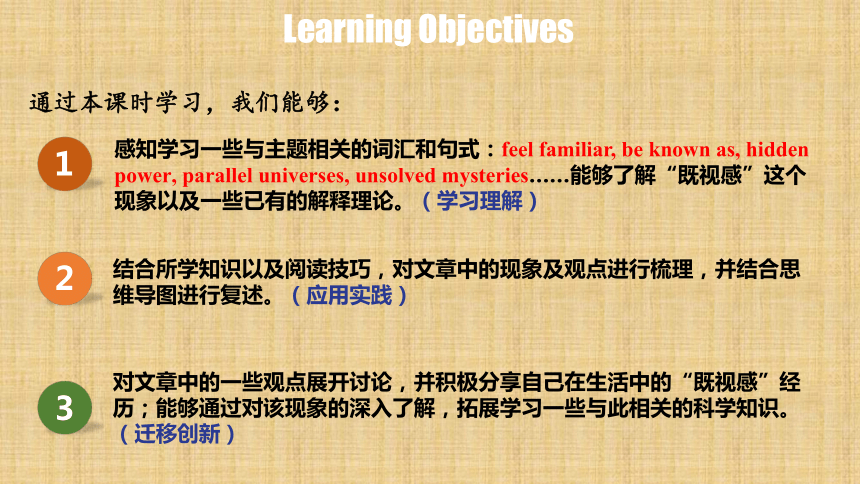


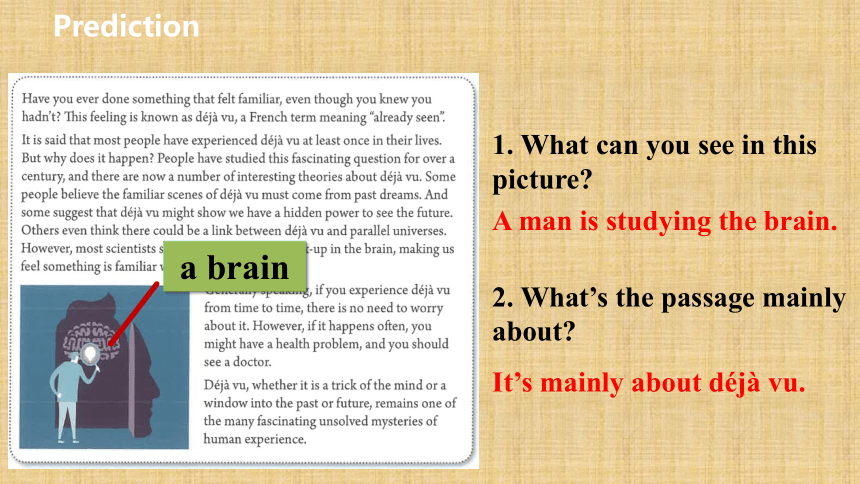
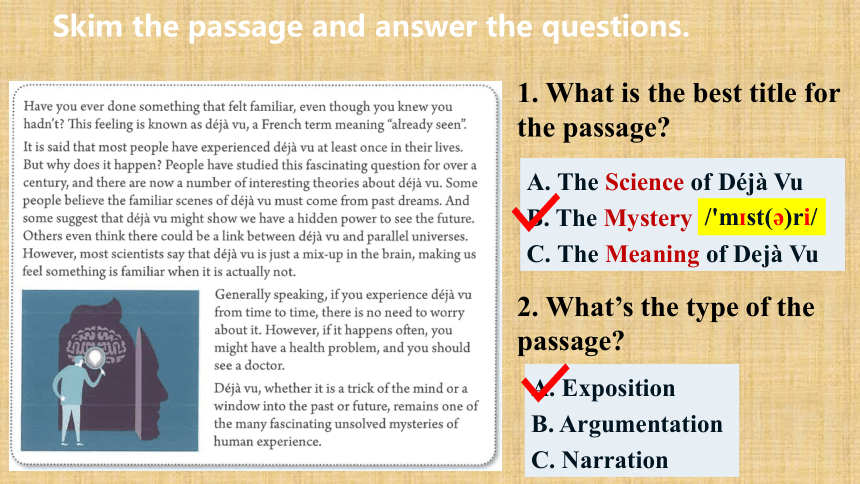
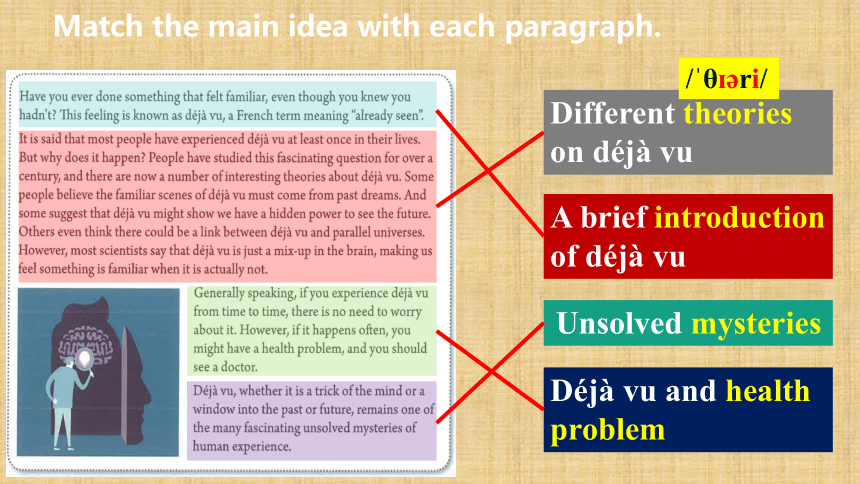
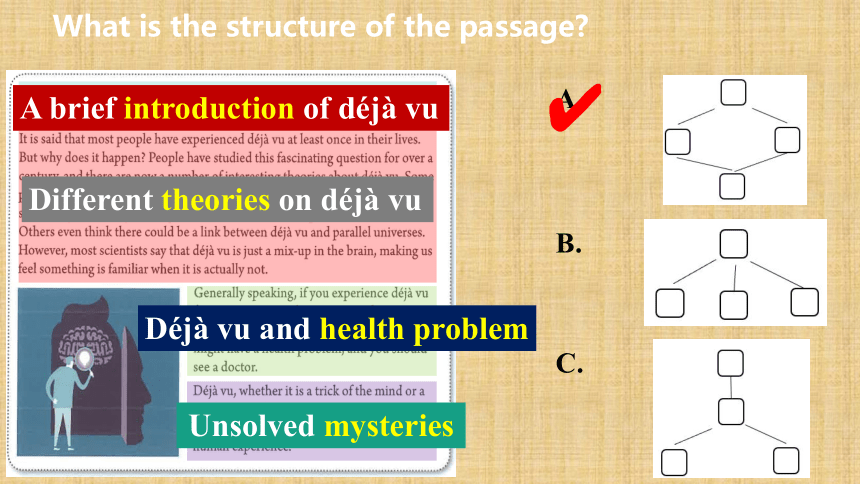
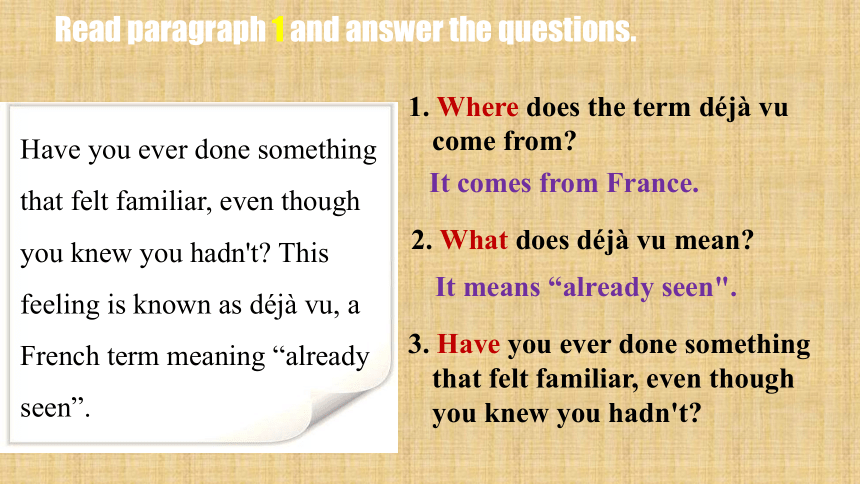
文档简介
(共28张PPT)
Unit 8
It must belong to Carla.
Section A (3a-3c)
2024-2025学年人教版九年级英语全册 ★★
Learning Objectives
感知学习一些与主题相关的词汇和句式:feel familiar, be known as, hidden power, parallel universes, unsolved mysteries……能够了解“既视感”这个现象以及一些已有的解释理论。(学习理解)
结合所学知识以及阅读技巧,对文章中的现象及观点进行梳理,并结合思维导图进行复述。(应用实践)
对文章中的一些观点展开讨论,并积极分享自己在生活中的“既视感”经历;能够通过对该现象的深入了解,拓展学习一些与此相关的科学知识。(迁移创新)
通过本课时学习,我们能够:
1
2
3
I drink a cup of wine whereas to the new rhyme.
Last year’s pavilion is now bathed in that old clime. Alas, when will the sunken sun in west be shown Flowers fall, whose glory I can scarcely help restore. Swallows return, whose grace I may have seen before. On fragrant paths in garden, I do roam alone.
一曲新词酒一杯,去年天气旧亭台。夕阳西下几时回?
无可奈何花落去,似曾相识燕归来。小园香径独徘徊。
may have seen
Do you know how to say it in French
思维导图发展历史
déjà vu
Do you know what déjà vu is
似曾相识的感觉可以被称为“即视感”,专业名词为海马效应(Hippocampal effect)。它是一种常见的生理现象,指的是人们对从未经历,但眼下正发生的事情产生似曾相识之感。
/ de ɑ vu /
Have you ever had that sense of déjà vu
Let’s learn more about déjà vu.
Prediction
1. What can you see in this picture
2. What’s the passage mainly about
A man is studying the brain.
a brain
It’s mainly about déjà vu.
Skim the passage and answer the questions.
A. The Science of Déjà Vu
B. The Mystery of Dejà Vu
C. The Meaning of Dejà Vu
1. What is the best title for the passage
A. Exposition
B. Argumentation
C. Narration
2. What’s the type of the passage
/'m st( )ri/
Match the main idea with each paragraph.
Different theories
on déjà vu
A brief introduction of déjà vu
Déjà vu and health problem
Unsolved mysteries
/ θ ri/
What is the structure of the passage
Different theories on déjà vu
A brief introduction of déjà vu
Déjà vu and health problem
Unsolved mysteries
A.
B.
C.
Read paragraph 1 and answer the questions.
Have you ever done something that felt familiar, even though you knew you hadn't This feeling is known as déjà vu, a French term meaning “already seen”.
1. Where does the term déjà vu come from
It comes from France.
2. What does déjà vu mean
3. Have you ever done something that felt familiar, even though you knew you hadn't
It means “already seen".
Read paragraph 2 and finish the mind-map.
1
2
3
4
Different
theories
Why does déjà vu happen
The scenes of déjà vu must come from .
familiar
past dreams
Déjà vu might show
we have a _____________
to see the future.
hidden power
There could be a ______between
déjà vu and ________________.
link
parallel universes
Déjà vu is just a ________ in the brain, making us feel something is familiar when it is actually not.
mix-up
/ p r lel/
/f m li (r)/
/'h d( )n/
/ ju n v (r)s/
Among all the opinions about déjà vu, which one interests you most Why
Read paragraph 3 and identify True or False.
Generally speaking, if you experience déjà vu from time to time, there is no need to worry about it. However, if it happens often, you might have a health problem, and you should see a doctor.
1. If you experience déjà vu often, there is no need to worry about it.
2. If déjà vu happens often, you might have a health problem, and you should see a doctor.
F
T
from time to time
/'d en( )r li/
Read paragraph 4 and answer the questions.
Déjà vu, whether it is a trick of the mind or a window into the past or future, remains one of the many fascinating unsolved mysteries of human experience.
1. What is the conclusion of the passage
Déjà vu remains one of the many fascinating unsolved mysteries of human experience.
2. Do you agree with déjà vu is a trick of the mind or a window into the past or future
I think déjà vu is a trick of the mind because…...
/tr k/
/ n s lvd/
Read the passage again and answer the questions.
3b
1.Where does the term déjà vu come from and what does it mean
2. What do some people believe about the familiar scenes during a déjà vu experience
It comes from France and it means “already seen".
Some people believe the familiar scenes of déjà vu must come from past dreams.
3. How do most scientists explain déjà vu
4. What should you do if you experience déjà vu often
Most scientists say that déjà vu is just a mix-up in the brain, making us feel something is familiar when it is actually not.
We should see a doctor.
What do you think about déjà vu Share your experiences or ideas with a partner.
3c
Write a passage to describe your experience with déjà vu.
What
Why
Who
When
How
Where
déjà vu
Be curious to explore the unsolved mysteries.
Make your own mind map and try to retell the passage.
An introduction of déjà vu
Different theories
on déjà vu
Déjà vu and health problem
Unsolved mysteries
The Mystery of Dejà Vu
remains one of the many fascinating
_________________ of human experience
Something that felt , even though you knew you hadn’t.
A French term meaning “____________”.
come from ___________
have a _______________ to see the future
there could be between déjà vu and _______________
a in the brain.
_______________: there is no need to worry about it
______: might have a health problem, and you should see a doctor
familiar
hidden power
a link
mix-up
from time to time
often
unsolved mysteries
already seen
past dreams
parallel universes
Read paragraph 1 and underline the language points.
Have you ever done something that felt familiar, even though you knew you hadn't This feeling is known as déjà vu, a French term meaning “already seen”.
感觉熟悉
=even if 尽管
术语含义
定语从句
让步状语从句
被称为,被认为是
Language points
1. Have you ever done something that felt familiar, even though……
familiar adj. 熟悉的
e.g.: 我很熟悉这首歌,因为我听过很多次了。
I am familiar with this song because I have heard it many times.
be familiar to 表示某事物对于某人来说是熟悉的,后面通常跟人
be familiar with 表示某人熟悉或了解某事物,后面通常跟表示事物或内容的名词
e.g.: 这首歌对我来说很熟悉,因为我听过很多次了。
This song is familiar to me because I have heard it many times.
2. This feeling is known as déjà vu, a French term meaning “already seen” .
① be known as... 被称为,被认为是
e.g.: 毛主席是一位伟大的领袖。
② be known for=be famous for 因…...而众所周知
e.g.: 这座城市因其美丽的海滩而闻名。
This city is known for its beautiful beaches.
③ be known to... 为……所熟知
e.g.: 这位歌手广为年轻的一代所熟知。
The singer is known to the younger generation.
Chairman Mao is known as a great leader.
Read paragraph 2 and underline the language points.
It is said that most people have experienced déjà vu at least once in their lives. But why does it happen People have studied this fascinating question for over a century, and there are now a number of interesting theories about déjà vu. Some people believe the familiar scenes of déjà vu must come from past dreams. And some suggest that déjà vu might show we have a hidden power to see the future. Others even think there could be a link between déjà vu and parallel universes. However, most scientists say that déjà vu is just a mix-up in the brain, making us feel something is familiar when it is actually not.
至少
大量的,许多
据说
熟悉的场景
隐藏能力
平行宇宙
混乱,杂乱
表语从句
宾语从句
宾语从句
宾语从句
宾语从句
时间状语从句
Language points
3. …and there are now a number of interesting theories about déjà vu.
e.g.: 许多学生在踢足球。
A number of students are playing football.
a number of “许多”,修饰可数名词复数,作主语时谓语动词用复数形式
the number of “……的数量”,后接可数名词复数,作主语时谓语动词用单数形式
e.g.: 学生的数量增加了。
The number of students has increased.
Read paragraph 3 and underline the language points.
Generally speaking, if you experience déjà vu from time to time, there is no need to worry about it. However, if it happens often, you might have a health problem, and you should see a doctor.
一般来说
偶尔
没有必要做某事
担心
健康问题
看医生
条件状语从句
条件状语从句
Language points
4. … there is no need to worry about it.
there is no need to do sth. 没有必要做某事
e.g.: 没必要担心未来。
There is no need to worry about the future.
e.g.: 没必要这么早起。
There is no need to get up so early.
e.g.: 没必要再争论这个问题了。
There is no need to argue about this question.
Read paragraph 4 and underline the language points.
Déjà vu, whether it is a trick of the mind or a window into the past or future, remains one of the many fascinating unsolved mysteries of human experience.
无论是…还是…
头脑的把戏
未解之谜
让步状语从句
Language points
5. … remains one of the many fascinating unsolved mysteries of human experience.
unsolved adj. 未解决的,未破解的
e.g.: 然而,在这个领域中还存在许多未解决的问题。
However, there are still a number of unsolved problems in this field.
solved adj. 已解决的
solve v. 解决
e.g.: 她尽了最大的努力解决这个问题。
She tried her best to solve the problem.
Summary
感觉熟悉
尽管
被称为,被认为是
术语含义
据说
大量的,许多
隐藏能力
feel familiar
even though=even if
be known as
term meaning
It is said that
a number of
8.平行宇宙
9.混乱,杂乱
10.一般来说
11.偶尔
12.没有必要做某事
13.无论是…还是…
14.未解之谜
hidden power
parallel universes
mix-up
generally speaking
from time to time
there is no need to do sth.
whether…or
unsolved mysteries
Exercises
一、单选。
1. I am familiar ____ this movie because I have watched it many times. .
A. to B. of C. in D. with
2. Zhangjiajie is known ______ its amazing mountains.
A. as B. for C. to D. with
3. A number of students _______ reading books now.
A.is B.was C. are D. were
4.There is no need ____________ about the future.
A.to worry B. worrying C. worries D. worried
D
B
C
A
Homework
Must do: 1. Make your own mind-map and try to retell the passage.
2. Finish the exercises in workbooks.
Try to do:
Search for more information about déjà vu.
Unit 8
It must belong to Carla.
Section A (3a-3c)
2024-2025学年人教版九年级英语全册 ★★
Learning Objectives
感知学习一些与主题相关的词汇和句式:feel familiar, be known as, hidden power, parallel universes, unsolved mysteries……能够了解“既视感”这个现象以及一些已有的解释理论。(学习理解)
结合所学知识以及阅读技巧,对文章中的现象及观点进行梳理,并结合思维导图进行复述。(应用实践)
对文章中的一些观点展开讨论,并积极分享自己在生活中的“既视感”经历;能够通过对该现象的深入了解,拓展学习一些与此相关的科学知识。(迁移创新)
通过本课时学习,我们能够:
1
2
3
I drink a cup of wine whereas to the new rhyme.
Last year’s pavilion is now bathed in that old clime. Alas, when will the sunken sun in west be shown Flowers fall, whose glory I can scarcely help restore. Swallows return, whose grace I may have seen before. On fragrant paths in garden, I do roam alone.
一曲新词酒一杯,去年天气旧亭台。夕阳西下几时回?
无可奈何花落去,似曾相识燕归来。小园香径独徘徊。
may have seen
Do you know how to say it in French
思维导图发展历史
déjà vu
Do you know what déjà vu is
似曾相识的感觉可以被称为“即视感”,专业名词为海马效应(Hippocampal effect)。它是一种常见的生理现象,指的是人们对从未经历,但眼下正发生的事情产生似曾相识之感。
/ de ɑ vu /
Have you ever had that sense of déjà vu
Let’s learn more about déjà vu.
Prediction
1. What can you see in this picture
2. What’s the passage mainly about
A man is studying the brain.
a brain
It’s mainly about déjà vu.
Skim the passage and answer the questions.
A. The Science of Déjà Vu
B. The Mystery of Dejà Vu
C. The Meaning of Dejà Vu
1. What is the best title for the passage
A. Exposition
B. Argumentation
C. Narration
2. What’s the type of the passage
/'m st( )ri/
Match the main idea with each paragraph.
Different theories
on déjà vu
A brief introduction of déjà vu
Déjà vu and health problem
Unsolved mysteries
/ θ ri/
What is the structure of the passage
Different theories on déjà vu
A brief introduction of déjà vu
Déjà vu and health problem
Unsolved mysteries
A.
B.
C.
Read paragraph 1 and answer the questions.
Have you ever done something that felt familiar, even though you knew you hadn't This feeling is known as déjà vu, a French term meaning “already seen”.
1. Where does the term déjà vu come from
It comes from France.
2. What does déjà vu mean
3. Have you ever done something that felt familiar, even though you knew you hadn't
It means “already seen".
Read paragraph 2 and finish the mind-map.
1
2
3
4
Different
theories
Why does déjà vu happen
The scenes of déjà vu must come from .
familiar
past dreams
Déjà vu might show
we have a _____________
to see the future.
hidden power
There could be a ______between
déjà vu and ________________.
link
parallel universes
Déjà vu is just a ________ in the brain, making us feel something is familiar when it is actually not.
mix-up
/ p r lel/
/f m li (r)/
/'h d( )n/
/ ju n v (r)s/
Among all the opinions about déjà vu, which one interests you most Why
Read paragraph 3 and identify True or False.
Generally speaking, if you experience déjà vu from time to time, there is no need to worry about it. However, if it happens often, you might have a health problem, and you should see a doctor.
1. If you experience déjà vu often, there is no need to worry about it.
2. If déjà vu happens often, you might have a health problem, and you should see a doctor.
F
T
from time to time
/'d en( )r li/
Read paragraph 4 and answer the questions.
Déjà vu, whether it is a trick of the mind or a window into the past or future, remains one of the many fascinating unsolved mysteries of human experience.
1. What is the conclusion of the passage
Déjà vu remains one of the many fascinating unsolved mysteries of human experience.
2. Do you agree with déjà vu is a trick of the mind or a window into the past or future
I think déjà vu is a trick of the mind because…...
/tr k/
/ n s lvd/
Read the passage again and answer the questions.
3b
1.Where does the term déjà vu come from and what does it mean
2. What do some people believe about the familiar scenes during a déjà vu experience
It comes from France and it means “already seen".
Some people believe the familiar scenes of déjà vu must come from past dreams.
3. How do most scientists explain déjà vu
4. What should you do if you experience déjà vu often
Most scientists say that déjà vu is just a mix-up in the brain, making us feel something is familiar when it is actually not.
We should see a doctor.
What do you think about déjà vu Share your experiences or ideas with a partner.
3c
Write a passage to describe your experience with déjà vu.
What
Why
Who
When
How
Where
déjà vu
Be curious to explore the unsolved mysteries.
Make your own mind map and try to retell the passage.
An introduction of déjà vu
Different theories
on déjà vu
Déjà vu and health problem
Unsolved mysteries
The Mystery of Dejà Vu
remains one of the many fascinating
_________________ of human experience
Something that felt , even though you knew you hadn’t.
A French term meaning “____________”.
come from ___________
have a _______________ to see the future
there could be between déjà vu and _______________
a in the brain.
_______________: there is no need to worry about it
______: might have a health problem, and you should see a doctor
familiar
hidden power
a link
mix-up
from time to time
often
unsolved mysteries
already seen
past dreams
parallel universes
Read paragraph 1 and underline the language points.
Have you ever done something that felt familiar, even though you knew you hadn't This feeling is known as déjà vu, a French term meaning “already seen”.
感觉熟悉
=even if 尽管
术语含义
定语从句
让步状语从句
被称为,被认为是
Language points
1. Have you ever done something that felt familiar, even though……
familiar adj. 熟悉的
e.g.: 我很熟悉这首歌,因为我听过很多次了。
I am familiar with this song because I have heard it many times.
be familiar to 表示某事物对于某人来说是熟悉的,后面通常跟人
be familiar with 表示某人熟悉或了解某事物,后面通常跟表示事物或内容的名词
e.g.: 这首歌对我来说很熟悉,因为我听过很多次了。
This song is familiar to me because I have heard it many times.
2. This feeling is known as déjà vu, a French term meaning “already seen” .
① be known as... 被称为,被认为是
e.g.: 毛主席是一位伟大的领袖。
② be known for=be famous for 因…...而众所周知
e.g.: 这座城市因其美丽的海滩而闻名。
This city is known for its beautiful beaches.
③ be known to... 为……所熟知
e.g.: 这位歌手广为年轻的一代所熟知。
The singer is known to the younger generation.
Chairman Mao is known as a great leader.
Read paragraph 2 and underline the language points.
It is said that most people have experienced déjà vu at least once in their lives. But why does it happen People have studied this fascinating question for over a century, and there are now a number of interesting theories about déjà vu. Some people believe the familiar scenes of déjà vu must come from past dreams. And some suggest that déjà vu might show we have a hidden power to see the future. Others even think there could be a link between déjà vu and parallel universes. However, most scientists say that déjà vu is just a mix-up in the brain, making us feel something is familiar when it is actually not.
至少
大量的,许多
据说
熟悉的场景
隐藏能力
平行宇宙
混乱,杂乱
表语从句
宾语从句
宾语从句
宾语从句
宾语从句
时间状语从句
Language points
3. …and there are now a number of interesting theories about déjà vu.
e.g.: 许多学生在踢足球。
A number of students are playing football.
a number of “许多”,修饰可数名词复数,作主语时谓语动词用复数形式
the number of “……的数量”,后接可数名词复数,作主语时谓语动词用单数形式
e.g.: 学生的数量增加了。
The number of students has increased.
Read paragraph 3 and underline the language points.
Generally speaking, if you experience déjà vu from time to time, there is no need to worry about it. However, if it happens often, you might have a health problem, and you should see a doctor.
一般来说
偶尔
没有必要做某事
担心
健康问题
看医生
条件状语从句
条件状语从句
Language points
4. … there is no need to worry about it.
there is no need to do sth. 没有必要做某事
e.g.: 没必要担心未来。
There is no need to worry about the future.
e.g.: 没必要这么早起。
There is no need to get up so early.
e.g.: 没必要再争论这个问题了。
There is no need to argue about this question.
Read paragraph 4 and underline the language points.
Déjà vu, whether it is a trick of the mind or a window into the past or future, remains one of the many fascinating unsolved mysteries of human experience.
无论是…还是…
头脑的把戏
未解之谜
让步状语从句
Language points
5. … remains one of the many fascinating unsolved mysteries of human experience.
unsolved adj. 未解决的,未破解的
e.g.: 然而,在这个领域中还存在许多未解决的问题。
However, there are still a number of unsolved problems in this field.
solved adj. 已解决的
solve v. 解决
e.g.: 她尽了最大的努力解决这个问题。
She tried her best to solve the problem.
Summary
感觉熟悉
尽管
被称为,被认为是
术语含义
据说
大量的,许多
隐藏能力
feel familiar
even though=even if
be known as
term meaning
It is said that
a number of
8.平行宇宙
9.混乱,杂乱
10.一般来说
11.偶尔
12.没有必要做某事
13.无论是…还是…
14.未解之谜
hidden power
parallel universes
mix-up
generally speaking
from time to time
there is no need to do sth.
whether…or
unsolved mysteries
Exercises
一、单选。
1. I am familiar ____ this movie because I have watched it many times. .
A. to B. of C. in D. with
2. Zhangjiajie is known ______ its amazing mountains.
A. as B. for C. to D. with
3. A number of students _______ reading books now.
A.is B.was C. are D. were
4.There is no need ____________ about the future.
A.to worry B. worrying C. worries D. worried
D
B
C
A
Homework
Must do: 1. Make your own mind-map and try to retell the passage.
2. Finish the exercises in workbooks.
Try to do:
Search for more information about déjà vu.
同课章节目录
- Unit 1 How can we become good learners.
- Section A
- Section B
- Unit 2 I think that mooncakes are delicious!
- Section A
- Section B
- Unit 3 Could you please tell me where the restroom
- Section A
- Section B
- Unit 4 I used to be afraid of the dark.
- Section A
- Section B
- Unit 5 What are the shirts made of?
- Section A
- Section B
- Review of Units 1-5
- Unit 6 When was it invented?
- Section A
- Section B
- Unit 7 Teenagers should be allowed to choose their
- Section A
- Section B
- Unit 8 It must belong to Carla.
- Section A
- Section B
- Unit 9 I like music that I can dance to.
- Section A
- Section B
- Unit 10 You're supposed to shake hands.
- Section A
- Section B
- Review of Units 6-10
- Unit 11 Sad movies make me cry.
- Section A
- Section B
- Unit 12 Life is full of the unexpected
- Section A
- Section B
- Unit 13 We're trying to save the earth!
- Section A
- Section B
- Unit 14 I remember meeting all of you in Grade 7.
- Section A
- Section B
- Review of Units 11-14
